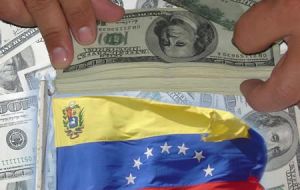MercoPress. South Atlantic News Agency
Short of dollars, Venezuela tightens currency exchange controls

Venezuela tightened currency-exchange controls this week cutting in half the amount of dollars that residents may obtain through the government to send to relatives abroad according to Official Gazette.
The amount which is requested through the state currency agency has been reduced from 1.800 to 900 US dollars a month. This follows a recent decision to lower the amount that travelers may spend abroad on their credit cards by half, to 2.500 US dollars a year.
The Venezuelan government imposed currency controls in a bid to stem capital flight since 2003 following a failed coup attempt against President Hugo Chavez and a punishing, months’ long opposition-led oil strike.
Controls require Venezuelans and companies doing business in the country to apply to obtain foreign currency at the official rate of 2.15 Bolivar to the US dollar. But those who cannot get what they need regularly turn to transactions in government bonds or the thriving black market, where the US dollar has been selling recently for nearly three times the official rate.
Venezuela relies on oil for 93% of its exports, and last year oil exports brought in more than 87 billion US dollars. However the amount is expected to drop sharply this year, some analysts expect by as much as 50 billion.
Businesses from banks to importers have recently complained of delays in receiving dollars through the currency agency Cadivi. Finance Minister Ali Rodriguez has said that due to the fall in oil earnings, the government is giving priority to imports of food and medicines.
In related news the latest figures from the Venezuelan Central Bank show that international reserves totaled 29.188 billion US dollars at the end of May.
This marked a drop of 306 million US dollars on a week before and a fall of 12.862 billion US dollars compared with 42.054 billion at the end of last year.
In the meantime, questions hover over the government’s management and use of oil revenues. The fall in the reserves since the turn of the year closely mirrors the transfer on January 21 of 12 billion USD from the Central Bank to a special fund set up by President Hugo Chávez to hold so-called “excess” or “surplus” reserves.
This fund, like the National Development Fund (Fonden), is largely beyond the scrutiny of either the public or the National Assembly.
Taking the special fund into account, economists argue that the inflow of hard currency into the reserves – from oil, above all else – is “not quite treading water” in terms of holding the line.




Top Comments
Disclaimer & comment rulesCommenting for this story is now closed.
If you have a Facebook account, become a fan and comment on our Facebook Page!